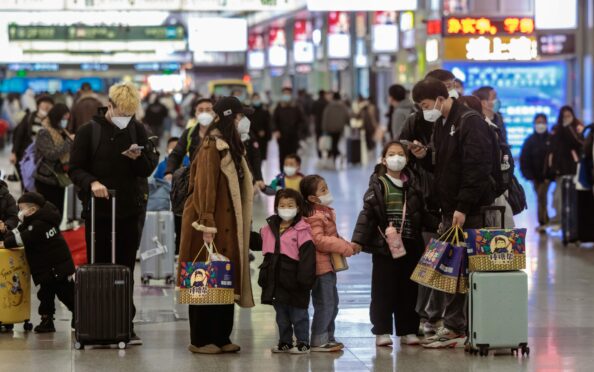
A leading expert warns easing restrictions on travel from China increases the risk of the virus changing.
Professor Rowland Kao fears the threat from Covid has diminished for most people but the virus still has the ability to mutate into a more dangerous variant.
Kao, a mathematical biologist who studies infectious disease dynamics, said he hopes the virus will eventually settle down and become more like seasonal flu but he warned we remain in uncharted territory.
It’s just over three years since Covid first emerged in China leading to millions of deaths around the world and restrictions on our daily lives.
As each new variant was confirmed, another lockdown was imposed, until enough people were either vaccinated or had the virus, eventually allowing a return to some semblance of normality in spring of 2022.
However, many countries have vaccinated a low number of people, including China, which is experiencing a huge surge in infections at the same time as the country allows citizens to travel again.
Professor Kao said: “Obviously numbers of infections in China are very high, so there will be some implications of new infections entering the country in large numbers and this will be true for most countries receiving visitors from China.
“However, the reality is we aren’t doing a whole lot about Covid now in any other way, and infection rates remain high – the last ONS survey was around 2% – so over a million are infected in the UK.
“There are going to be worries about new variants, of course, but if we were serious about doing something about Covid we should do a lot more.”
The Omicron version of Covid is mutating, according to professor Kao, but there has been no new variant of concern. “The virus doesn’t seem to be changing dramatically, which is a good thing at the moment,” he said. “There are sub-variants emerging but it’s a little bit different to what we had before, in that we had these very big events where Delta and Omicron replaced previous dominant variants.”
Kao, who is based at the University of Edinburgh, said: “Quite a few people have already had Covid at least once, providing some protection in the same way that getting vaccinated does.
“But it still causes severe illness and can cause things like long Covid.”
At least 60,000 die of Covid in China in last five weeks
Almost 60,000 people have died of Covid in Chinese hospitals since early December when the country relaxed its strict lockdown restrictions, authorities announced yesterday.
The government in Beijing said the emergency peak of its latest coronavirus surge appeared to have passed.
The toll includes 5,503 deaths due to respiratory failure directly caused by Covid and 54,435 fatalities from other ailments combined with Covid since December 8, the National Health Commission announced.
But the real figure is likely to be much higher as the official data related only to those who died in hospital.
The report would more than double China’s official Covid death toll to 10,775 since the disease was first detected in the city of Wuhan in late 2019.
China stopped reporting data on Covid deaths and infections after abruptly lifting its anti-virus controls in early December despite a surge in infections that began in October and has filled hospitals with patients.
It is estimated that some major cities have seen infection rates of up to 90% of their populations since then, with some 900 million people infected.
China kept its infection rate and deaths lower than many other countries with a “zero-Covid” strategy that aimed to isolate every case. That shut down access to some cities, kept millions of people at home, and sparked angry protests.
The surge in infections has been blamed on the shielding the population, rather than inoculating them effectively against the Covid virus.

Enjoy the convenience of having The Sunday Post delivered as a digital ePaper straight to your smartphone, tablet or computer.
Subscribe for only £5.49 a month and enjoy all the benefits of the printed paper as a digital replica.
Subscribe